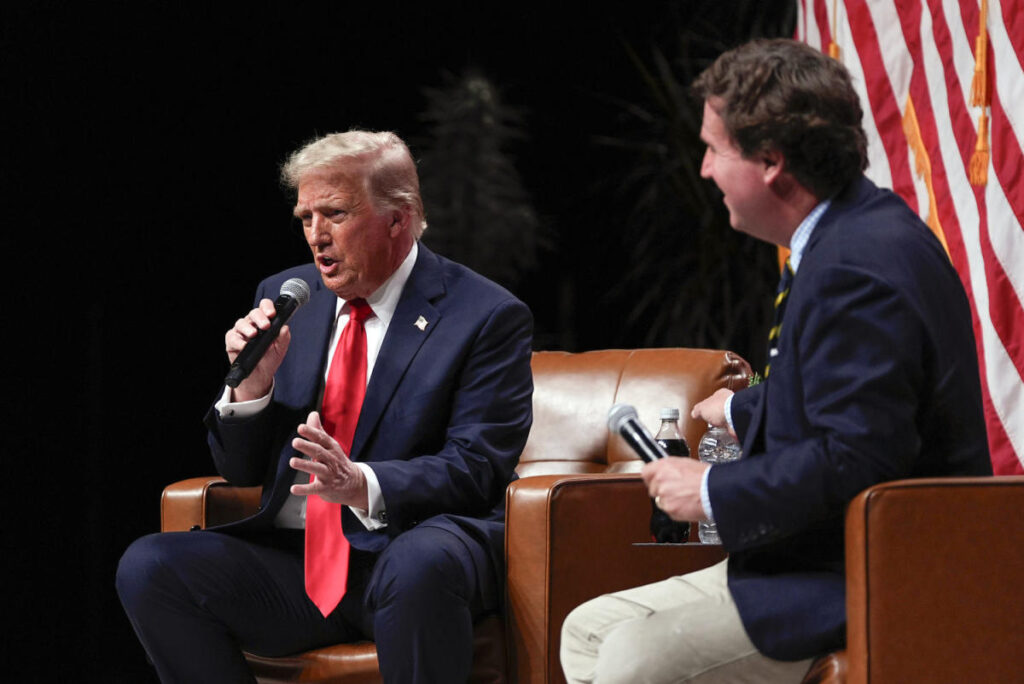Arizona Attorney General Kris Mayes has announced an investigation into former President Donald Trump’s recent comments regarding former GOP Representative Liz Cheney, to determine if his remarks constitute a death threat under Arizona law. Mayes, a Democrat, stated she has instructed her criminal division chief to examine Trump’s statement, acknowledging the seriousness of the matter, particularly in relation to the upcoming elections and public safety at polling places. The remarks in question were made at an event with Tucker Carlson, where Trump suggested Cheney would reconsider her political stances if she were the target of violence, further exacerbating the situation with a post on Truth Social criticizing her courage.
During his speech, Trump described Cheney as a “radical war hawk” and suggested she would respond differently if faced with armed conflict. He invoked a scenario of her being confronted with rifles to illustrate his point, which has alarmed some political figures and raised concerns about the implications of such violent rhetoric. After the public response to his comments, Trump doubled down on his statements, indicating that Cheney, who has been critical of him, lacks the courage to engage in military action herself. His communications are positioned within a larger context of escalating aggressive rhetoric aimed at both opponents and the political landscape as a whole.
As the investigation into Trump’s comments unfolds, the attorney general’s office is confirming their commitment to determining if the statements violate laws regarding threats in Arizona. While seeking clarity on legal ramifications, Mayes expressed her concerns about the broader impact such statements could have on political discourse and public safety, particularly in a charged electoral environment. Critics within the Democratic Party have voiced outrage, framing Trump’s remarks as a dangerous precedent in contemporary politics and calling for accountability in the face of escalating hostility within political rhetoric.
Vice President Kamala Harris also chimed in, labeling Trump’s comments as disqualifying for anyone seeking the presidency. She emphasized that the violent undertones of his rhetoric not only represent a personal vendetta against political opponents but also signal a deeper instability that could threaten the fabric of democratic discourse. Harris’s remarks echo broader concerns that Trump’s aggressive language could incite violence and undermine public safety, particularly in a polarized political climate where tensions are already high.
The increased violence and hostility in Trump’s rhetoric over the past month have raised alarms across the political spectrum. He has previously branded his opponents as the “enemy from within” and suggested extreme measures, including the use of military force against citizens. His campaign spokesperson defended his position, framing Trump’s pointed critiques of figures like Cheney as justified given the context of their political disagreements, particularly regarding military conflict and foreign policy. The rhetoric being employed suggests a strategy aimed at energizing his base by appealing to a sense of grievance and conflict.
The narrative surrounding Trump’s comments is reflective of a larger trend in American politics, where divisive language and conflictual discourse seem to persist at the forefront of political engagement. As investigations continue and reactions unfold, the implications of such rhetoric on the electoral landscape and public perception of political figures will become increasingly pivotal. Law enforcement’s response to Trump’s remarks, and how political leaders navigate the fallout, will likely affect not just political campaigns but the broader dialogue on political civility and safety leading into future elections.

